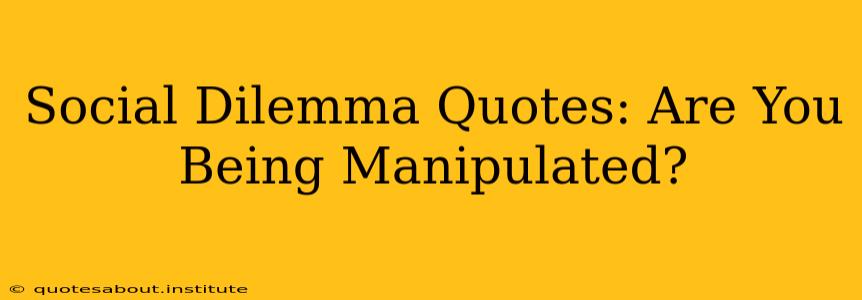Social Dilemma Quotes: Are You Being Manipulated?
The Netflix documentary "The Social Dilemma" sparked a global conversation about the manipulative power of social media. Its chilling insights, delivered through interviews with former tech executives, left many viewers questioning their relationship with their favorite apps. While the film doesn't offer easy answers, its impactful quotes serve as powerful reminders of the complex ethical and psychological challenges posed by our digital lives. This article delves into some of the most memorable quotes from the film, exploring their meaning and implications. We'll also address common questions surrounding social media manipulation and its impact on our lives.
What is the main point of the Social Dilemma?
The central argument of The Social Dilemma is that social media platforms, designed to be addictive and engaging, are fundamentally manipulating users for profit. This manipulation isn't always overt; it's often subtle, leveraging psychological vulnerabilities to keep us hooked. The film argues that this system prioritizes engagement metrics—likes, shares, comments—above user well-being, leading to detrimental consequences for mental health, societal polarization, and democratic processes. The creators aim to raise awareness of these issues, encouraging critical reflection on our digital habits.
What are some of the most impactful quotes from The Social Dilemma?
Several quotes from The Social Dilemma resonated deeply with audiences, encapsulating the film's core message:
-
"Your brain is a biological machine. The technology is designed to exploit the vulnerabilities of your brain." This quote highlights the scientific understanding behind social media's addictive nature. It's not just about mindless scrolling; it's about the sophisticated design that triggers our reward pathways, making us crave constant engagement.
-
"We're all being experimented on." This statement captures the unsettling reality that users are essentially test subjects in the ongoing quest to optimize engagement. Data collection and algorithm manipulation are not always transparent, leaving individuals unaware of the extent of their exploitation.
-
"If you're not paying for the product, you are the product." This quote, often attributed to various sources, neatly summarizes the core business model of many social media platforms. Our attention, data, and personal information are the commodities being sold to advertisers.
-
"It's a race to the bottom of the brain stem." This quote emphasizes the ruthless competition between social media companies to capture and maintain user attention. The strategies employed often prioritize base-level emotional responses over rational thought or critical engagement.
How do social media algorithms manipulate users?
Social media algorithms employ sophisticated techniques to manipulate users. These techniques include:
- Personalized Feeds: Algorithms curate content based on your past interactions, creating a filter bubble that reinforces existing biases and limits exposure to diverse perspectives.
- Infinite Scroll: The endless stream of content makes it difficult to disengage, contributing to excessive screen time and addictive behavior.
- Push Notifications: These alerts hijack our attention, interrupting our flow and prompting us to check our devices repeatedly.
- Gamification: Features like likes, comments, and shares create a sense of reward and achievement, driving engagement.
- Targeted Advertising: Ads are tailored to your interests and demographics, leveraging personal data to influence purchasing decisions.
Are there any solutions to the issues raised in The Social Dilemma?
The Social Dilemma doesn't offer simple solutions, but it highlights the need for greater awareness, regulation, and personal responsibility. Possible solutions include:
- Increased Media Literacy: Educating users about algorithmic manipulation and the psychology of social media engagement.
- Government Regulation: Implementing stricter data privacy laws and regulations to protect users from exploitation.
- Platform Transparency: Demanding greater transparency from social media companies regarding their algorithms and data practices.
- Personal Accountability: Consciously managing social media consumption and developing healthy digital habits.
The impact of social media on our lives is a complex issue with no easy answers. The Social Dilemma serves as a crucial starting point for a much-needed conversation about the ethical implications of these powerful technologies and empowers individuals to take control of their digital experiences. By understanding the manipulative techniques employed, we can begin to build a more conscious and healthy relationship with the digital world.

